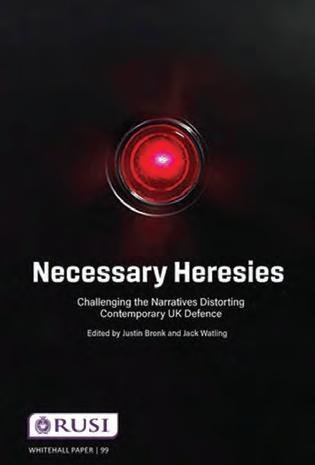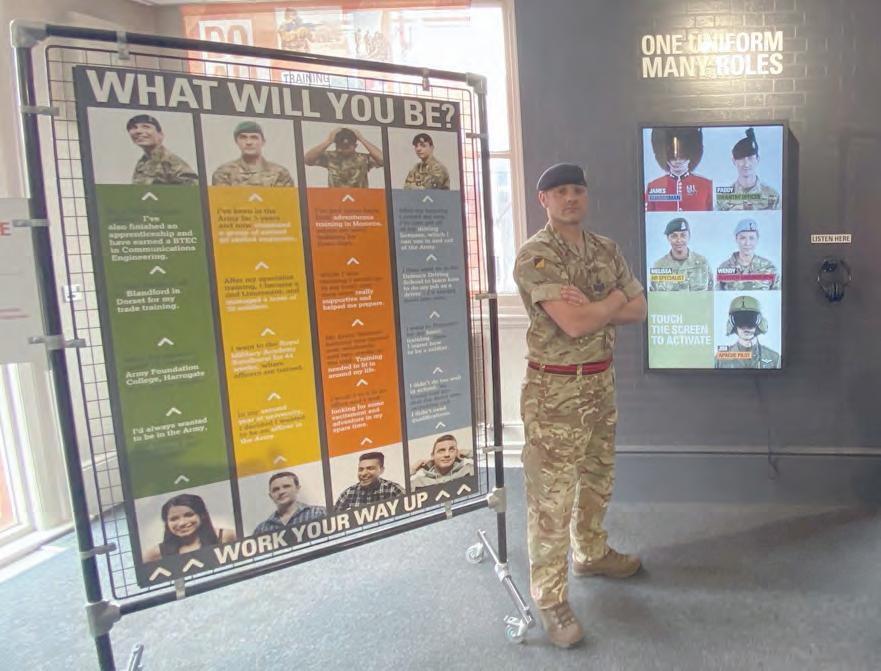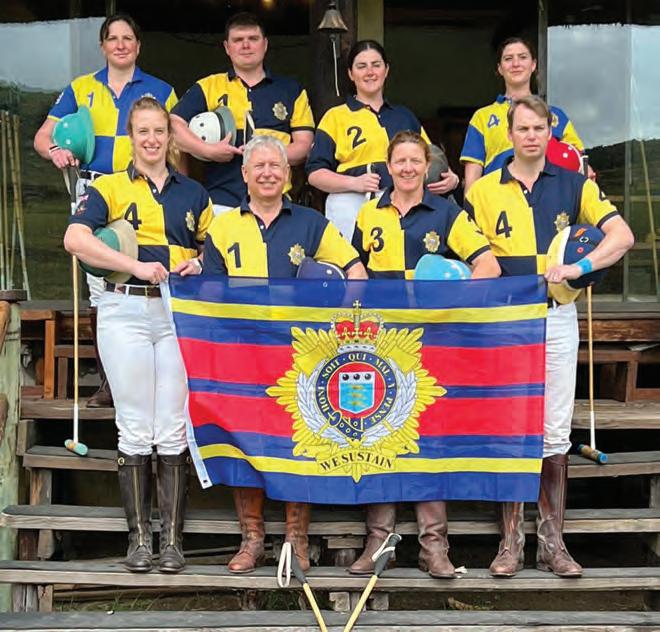
9 minute read
RLC Polo
By Capt Henry Christiansen
The RLC Polo Club overseas sports visit was originally due to take place in 2020 and, like all military sports during COVID, was unfortunately postponed. It was therefore even more special this time around for the RLC Polo Team to be able to get away to South Africa and really immerse themselves in some pre-season high quality training with professional coaches and excellent horses.
Some of the team had been to Selby Williamson’s ‘Jurassic Park Polo Academy’ before but for others, this was their first time. Selby Williamson (ex Capt of the national South African Polo Team) coaches many other British Army regimental teams as well as groups and players from all over the world. The main aim for the visit was to develop players’ skills prior to the beginning of the UK Polo season, thereby giving the RLC team the best chance of success at upcoming competitions.
Jurassic Polo is based on Selby Williamson’s farm in Kwazulu-Natal, in the picturesque region near the Drakensburg mountains. Visitors and guests of Jurassic Polo stay within cottages and rooms dotted about the farm grounds and meals are taken centrally with the Williamson’s home. This had the bonus of enabling the RLC players to get to know each other better as many of us had not met before or since COVID-19 put a halt to the sport.
We were not thrown straight into the deep end with chukkas and tournaments, instead the training began by bringing everyone back down to the basics. This was achieved by using ‘wooden horses’, a barrel on legs with a saddle on it. This allowed us to focus solely on hitting techniques with one-on-one instruction from the Jurassic Team without being distracted by having to manage a horse as well. This was to prove a very welcome staple throughout the whole visit daily we would start and then finish with stick and ball exercises which helped to build muscle memory and our hitting technique.
As well as the wooden horse exercises, we were able to go out on a long hack around the farm as well as practice riding skills in the indoor school. For some of the team, it had been a long time since they had received flatwork tuition and so this experience and training was most welcome.
Once the pitches had dried out enough for us to ride on, we started with stick and ball exercises; low level dribbling and passing to start putting what we had learned on the wooden horses to good use. Once we had ‘zeroed’ our various shots, we progressed onto chukkas with constant instruction from the Jurassic Team. Not only did we play on the beautiful Williamson farm pitches but also at the local club grounds at Swartburg. Playing on such immaculate fields was a real treat and while we were there, the local high goal team that included members of the South African national side were also playing so there was plenty to watch and try and emulate later.
When the training for each day had finished, we had free time to be able to enjoy the local area and the rest of what the farm had to offer. Of note was a tour of the farm one evening courtesy of Codie, Selby’s son. We were treated to ‘sundowners’ (a snack picnic) overlooking the area from one of the hills on the farm, the scenery was utterly breath-taking. One cannot come to South Africa and not have a famous ‘Braai’ and Selby treated us to several wonderful barbecues which helped us truly explore what food South Africa has to offer.
For all who attended, this was an amazing experience and one that will not be forgotten. The RLC Polo Team wishes to thank the Jurassic Park Polo Academy for generously hosting us and providing us with such excellent horses throughout. Without this, our game would never have developed at the rate it did. The RLC Equestrian Chairman, Lt Col Lucy Anderson, would also like to thank all Commanding Officers who were able to release their players to participate in such a great visit.
Exercise JURASSIC CHUKKA
8 Back row: Capt Nicky Hemsworth,
Capt Henry Christiansen, Pte Elizabeth Ellis, OCdt Tilly Harrison, Front row: Lt Alika Molloy, Maj Matt Pittaway, Lt Col Lucy Anderson, Capt Nick Lowe
By SSgt Surye Gurung 10 QOGLR
The 10 The Queen’s Own Gurkha Logistic Regiment (QOGLR) Basketball team deployed on Ex QOGLR BALLERS 2022, an Overseas Sports Visit (OSV) to Lisbon, Portugal over the period 3 – 10 Apr 22. The aim of this OSV was to maximise team performance, build team cohesion and gain experience playing against the unfamiliar opponents from overseas. Furthermore, it was an effort to enhance the relationships and reputation of the British Forces with the local people from Lisbon.
The Regimental Basketball team, comprising of 19 members, travelled to Lisbon on 3 Apr 22 and was accommodated near the University of Lisbon before regular training sessions commenced. Four robust training sessions were conducted at the University of Lisbon, led by Sgt Fostin and Cpl Nom. Different attributes of the game were discussed, and team set plays were rehearsed. The players had opportunities to hone their individual skills and synchronise with the team set plays. Two competitive matches were played against a very talented local team, the Southsiders Lisbon. The 10 QOGLR team was victorious by a very narrow margin on both occasions displaying complete understanding of the team tactics and set plays. Improved team co-ordination, increased confidence individually
Ex QOGLR BALLERS 2022
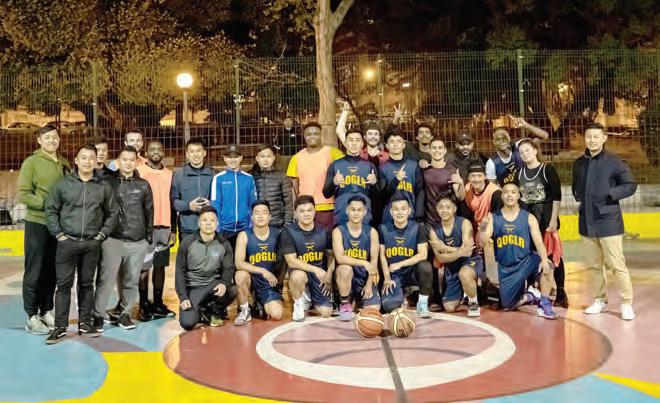
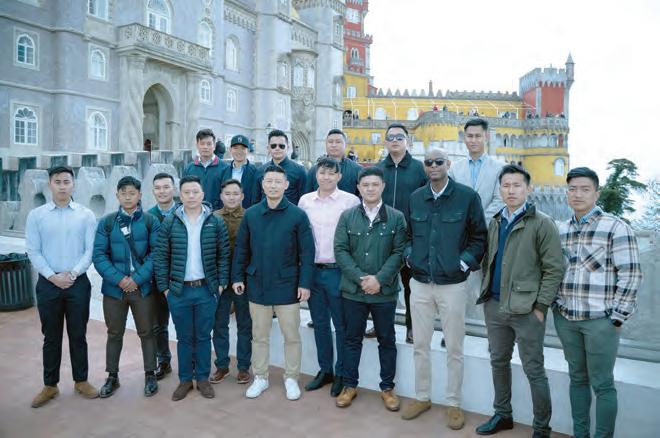
8 One of the OSV aims was to build
team cohesion
and as a team were the clear results of the robust and well organised training.
Apart from the training benefits, the OSV provided an excellent opportunity for team bonding and to learn the culture and tradition, experience food and visit the historic city of Lisbon. The team organised a city tour to the famous Pena Palace in Sintra which is located approximately 32 miles to the North West of Lisbon. The Pena Palace is one of the most famous tourist attractions, which bears a very rich history. At the end of the tour, the team organised a team dinner at the restaurant ‘Love Lisbon’ where the team enjoyed the amazing foods and drinks that the city had to offer, especially the seafood.
In conclusion, the entire OSV was a fantastic experience; learning basketball in depth and exploring the city of Lisbon at the same time. The team would like to thank the 10 QOGLR Chain of Command and the Army Sports Control Board for the opportunity. It must also thank the Army Sports Lottery, the HQBG Brigade Education and Welfare Fund, the Berlin Infantry Bde Memorial Fund, 4 Division Trust Fund (Sports) and the QOGLR Trust for providing the funding support for the OSV. Lastly, the team would like to thank Capt Niraj Gurung (GSPS), the tour OIC, for organising the OSV successfully and providing knowledge about what Army sports and the British Army has to offer when developing potential new talents.
8 19 members of the basketball team
travelled to Lisbon
8 The team visited the Pena Palace
while in Portugal
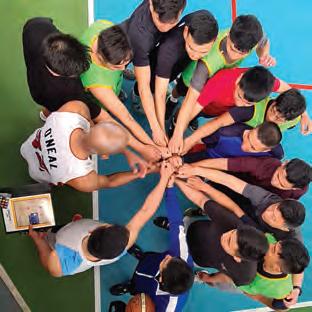
In this edition of The Sustainer the RLC Foundation Book Club reviews two relatively recent publications; which are both thought provoking and disconcerting in their own way. Each are likely to become highly debated topics within defence, wider government, academia and industry over the next twelve months.
Volt Rush; The Winners and Losers in the Race to go Green, Henry Sanderson, Oneworld, 2022. The Integrated Review spelt out that Britain could either be a leader in new technologies or it would be left behind – so, no choice at all really. Volt Rush offers cautious optimism for a world transitioning to a decarbonised future, but it also highlights that there is likely to be acute geopolitical competition for precious resources; made worse by the fact that China has already secured a head start in guaranteeing its supply of rare earth elements. All those new cleaner electric cars that you may think will offer you guilt free motoring are likely to come at a cost, albeit a different one from climate change. Sanderson details some of the precious elements which must be secured to deliver the brave new green world. Cobalt, nickel and copper will all be in short supply and high demand but nothing like lithium whose demand will increase thirtyfold by 2030 (the date from which, coincidently, you will not be able to buy a petrol car in the UK). China seems to have taken the approach that owning the supply base is safer than trading for it. The author explores the background of what and from whom China has already secured resources for its domestic manufacturing base; indicating that traditional global market forces may not prevail in the near future where earth elements may not be for sale at any price. Countries may look to onshoring options (the UK is currently assessing lithium deposits in Cornwall) but it is highly unlikely that domestic supply will meet increasing demands. How this global conundrum will unravel is unclear but the competitive tempo is building – perhaps it’s time to dust off your bicycle clips whilst watching already stressed supply chains bend themselves into a new shape.
RLC Foundation Book Club

Necessary Heresies: Challenging the Narratives Distorting Contemporary UK Defence, Ed by Justin Bronk and Jack Watling, RUSI, Whitehall Paper 99, 2021. If challenge is seen as a good thing, then Necessary Heresies should form part of the central debate on the future of UK defence; its priorities, realistic fiscal resources versus emerging technologies versus military structures, and how threat narratives should be framed. Bronk and Watling question the current narratives espoused by senior officials which lead, in their opinion, to some problematic outcomes. The aim of the paper is to expose the realities of weaponising selected emerging technologies and correcting some of the misleading narratives surrounding them. Seven distinguished authors examine a range of defence technologies which they believe have, to varying degrees, been misreported. This situation has developed as a direct result of an absence of detail in how future capabilities actually work. From cyber warfare through swarming munitions to conflict in space, the authors provide evidence of how challenging some of the technologies are to field as a consistent suite of game-changing weapon systems. By overemphasising the threat and cherry picking some advantages of these emerging technologies the authors contend that misleading narratives can distort Defence in several ways, including acquisition decisions which subsequently influence the balance of conventional forces. What readers may find fascinating is the way the authors unpick some widely accepted military jargon such as ‘grey zone operations’ – they explore what this descriptor might mean, what might be left out and the area for confusion (which could be exploited in some circles). Whilst there may be another technological step change looming over the horizon that constitutes a new revolution in military affairs, readers may be more persuaded that conventional forces (mass) still have a large part to play in future diplomacy, deterrence and conflicts. The paper posits that reducing what is left of Britain’s conventional forces on the promise of new fieldable technologies which bring efficiencies (read cuts) is currently unproven. A RUSI paper that needs to be widely read, understood and debated before decisions are made – if it’s not too late!
